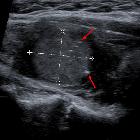follicular thyroid cancer






Follicular thyroid carcinoma (FTC) is the second most frequent malignancy of the thyroid gland after papillary cancer and accounts for 10-20% of all thyroid neoplasms.
Epidemiology
It typically occurs in women and in an older age group than papillary (i.e. 40-60 years of age).
Pathology
Unlike papillary, it metastasizes late to lymph nodes, with only 5-10% of patients having nodal metastases at the time of diagnosis. Haematogenous spread is however much more common with 20% or so of patients having distant haematogenous metastases at presentation.
Genetics
The Ras oncogene is positive in a significant proportion of individuals.
Variants
- classic follicular thyroid carcinoma
- insular variant
Microscopy
Cytology after fine-needle aspiration cannot differentiate between a follicular thyroid adenoma and a follicular thyroid carcinoma. Surgical resection is necessary.
Radiographic features
Ultrasound
- lesions are typically hypoechoic
- usually lacks cystic change
Nuclear medicine
Follicular thyroid cancer typically concentrates pertechnetate, but not radioiodine.
Treatment and prognosis
Treatment tends to revolve around local surgical treatment and radioactive iodine.
Prognosis is not as favorable as papillary, but better than anaplastic, and depends on the presence and extent of distal metastatic disease. In local disease, 90% 10-year survival can be expected, whereas with a distant disease that figure drops to approximately 50%.
Differentiation of follicular carcinoma from follicular adenoma of the thyroid cannot be made on cytology alone and requires examination of the surgical specimen looking for extracapsular spread.
Siehe auch:
- Schilddrüse
- Schilddrüsenkarzinom
- papilläres Schilddrüsenkarzinom
- Medulläres Schilddrüsenkarzinom
- anaplastisches Schilddrüsenkarzinom
- ACR TI-RADS scoring system
- Neoplasien der Schilddrüse
- follikuläres Adenom der Schilddrüse
- follikuläre Variante des papillären Schilddrüsenkarzinoms
- papillary cancer
und weiter:

 Assoziationen und Differentialdiagnosen zu follikuläres Schilddrüsenkarzinom:
Assoziationen und Differentialdiagnosen zu follikuläres Schilddrüsenkarzinom:





